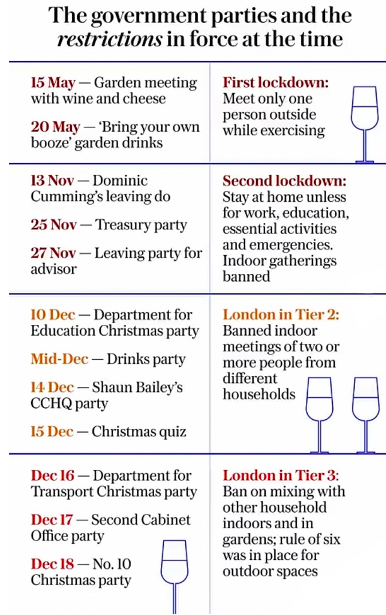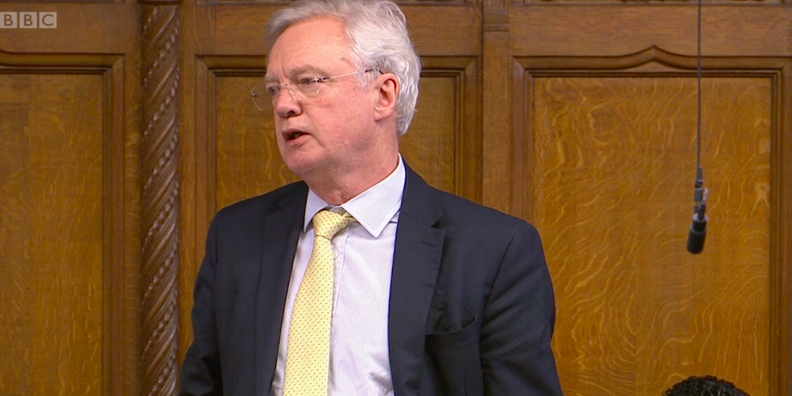Johnson’s position as Prime Minister is hanging precariously in the balance. For the past few weeks, he and his Conservative Party have been facing growing outrage regarding ‘partygate’ – a series of allegations about parties attended by Conservative ministers during the 2020 Summer and Winter lockdowns. An inquiry, headed by Sue Gray, a high-ranking civil servant, is due to come out next week, which will shed some light onto the inner goings on of Downing Street during this period. Yet, it is only as of the past few days that I have begun to take seriously the potential prospect of Johnson’s removal as PM of this country.
Johnson’s government has been accused of hosting a grand total of 12 parties, sparking public and opposition outcry. Whilst people in the UK forewent seeing friends and family, there was ‘industrial scale partying’ at No.10, as Keir Starmer put it. Firstly, it goes without saying that any accusation of this magnitude regarding hypocrisy would be devastating for any British government. People hate the idea that there is one rule for them, and one rule for Downing Street. People also hate being taken for fools, and the combination of these factors can become rather potent. This can be seen in the case of Allegra Stratton, former Downing Street Press Secretary who was caught on videotape joking about Christmas parties that Downing Street had hosted – she apologised and resigned. I can’t help but slightly recoil at the footage, knowing that I and many others weren’t able to see loved ones over the Christmas period. Therefore, it is no surprise that ‘partygate’ has snowballed into the biggest scandal Johnson has faced yet.

There is also another reason these accusations are especially worrying for the government on a wider level. Ever since the first Covid vaccines had been administered, this vaccine roll-out has been championed by the PM and Tory ministers as being clear evidence of the parties’ efficient and proactive governing during the pandemic. So, a scandal right at the heart of the pandemic issue really does chip away at this pro-Johnson argument – another worrying fact I am sure is playing on the PM’s mind.
Johnson has also been criticised for his conduct regarding the handling of these allegations: At first, he denied he had known about any parties, yet we know now that he attended at least one of them (20th May 2020 in the Downing Street garden).
To be honest, I do not find particularly surprising these revelations of Downing Street partying. In my opinion, there is surely a real culture problem at the heart of this government regarding what most think of as ‘good conduct’. Firstly, we can look at Johnson himself. The PM is not exactly renowned for being a man of detail, he is often seen stumbling over and dodging tricky questions – the likes of many Whitehall commentators often describe him as a ‘buffoon’. On the one hand, it is the perception of his being a jovial character that possibly won him the 2019 election: to many he is a breath of fresh air in stuffy British politics. Yet I think that this somewhat ‘care-free’ attitude may have seeped further down government – these parties are clearest manifestation of this, but there have been other signs too:
If we think back to May 2020 the Cummings’ Barnard Castle scandal pops to mind, when Johnson defended Dominic Cummings for seemingly breaching Covid restrictions (sound familiar?). Perhaps this was a warning sign of the hypocrisy already present at the highest level in government. In addition, before that, in 2019, Johnson prorogued parliament in order to push through Britain leaving the EU without parliamentary consent, this was found to be illegal by the UK’s Supreme Court. And even the government’s attempt to break International Law in September 2020 through the Internal Market Bill points to an inherent disregard for the rules of the land.
These wider questions that partygate brings up, the culture problem and hypocrisy at the heart of government, are very damaging to the party in the long-term, and could rob them of many seats at the next election. Generally, voters make their decisions at the ballot box based on principles/overall perception of the deferring parties – if this story has cut through to the public (it surely has), then the Tories are set for a challenging General Election. If Labour can present themselves as a ‘suitable government in waiting’, which they seem to be doing a fairly good job of, this scandal could be a huge win for the opposition.
Now things are looking very dangerous for the PM. In the last few days, criticism has only expanded – from stemming largely from Labour and the public to members of Johnson’s own party speaking out against him. It is in situation like these when a Prime Minister really knows they’re in trouble. Douglas Ross, leader of the Scottish Conservative Party called for Johnson to resign, saying his position is “untenable”. Tory MP Christian Wakeford has defected to Labour, telling Boris Johnson he is “incapable of leadership” – this is a very big deal. As if this all wasn’t enough, in Prime Minister’s Questions on Wednesday, former Conservative Brexit Minister David Davis stood up and said, “I expect my leaders to shoulder the responsibility for the actions they take. Yesterday he did the opposite of that. So, I will remind him of a quotation which may be familiar to his ear: Leopold Amery to Neville Chamberlain. “You have sat too long here for any good you have been doing. In the name of God, go.” Oh the drama.

Not only is Johnson facing a possibly damning inquiry led by Sue Gray, which aims to establish the facts around parties taken in Downing Street, but a vote of confidence is also looking increasingly likely: Tory whips have confirmed they think they will receive the required 54 letters/emails from MPs calling for such a vote. As these letters/emails are all sent in confidentially, we cannot be sure of how many MPs have handed them in – currently only 4 letters are confirmed. Yet this number is bound to be bigger in reality, especially with whips saying they think the 54-mark will be reached. Indeed, a further 23 MPs have either publicly or are rumoured to have criticised the PM’s actions. I would wager that the 54 letter/email requirement will likely not be met by the time of Sue Gray’s report. Yet if the report alludes that Johnson broke the ministerial code, or worse, misled parliament, I would not be surprised if a vote of no confidence is triggered by this time next week.
Now what would happen if this occurred? Johnson would have to receive the backing over a majority of MPs, which is 131 (as it stands). I find it hard to believe that over half of Johnson’s MPs would vote against him in this situation – even whilst Theresa May was in the throes of Brexit, she won her no confidence vote by 200 v 117. However, there is of course a possibility that Conservative MPs decide they can’t put their faith in Johnson anymore, nor that they can rely on being able to keep their job if he is still leader of the party by the next General Election.
So, Boris Johnson does seem to be in real trouble now, as does the fate of the Conservative Party. The British public is angry, and rightly so. Whatever the outcome of Sue Gray’s highly anticipated report, or whether or not a vote of no confidence is triggered, this scandal does not bode well for the long-term future nor success of Boris Johnson – perhaps the Prime Minister should think twice next time before breaking the rules that he himself set out.
